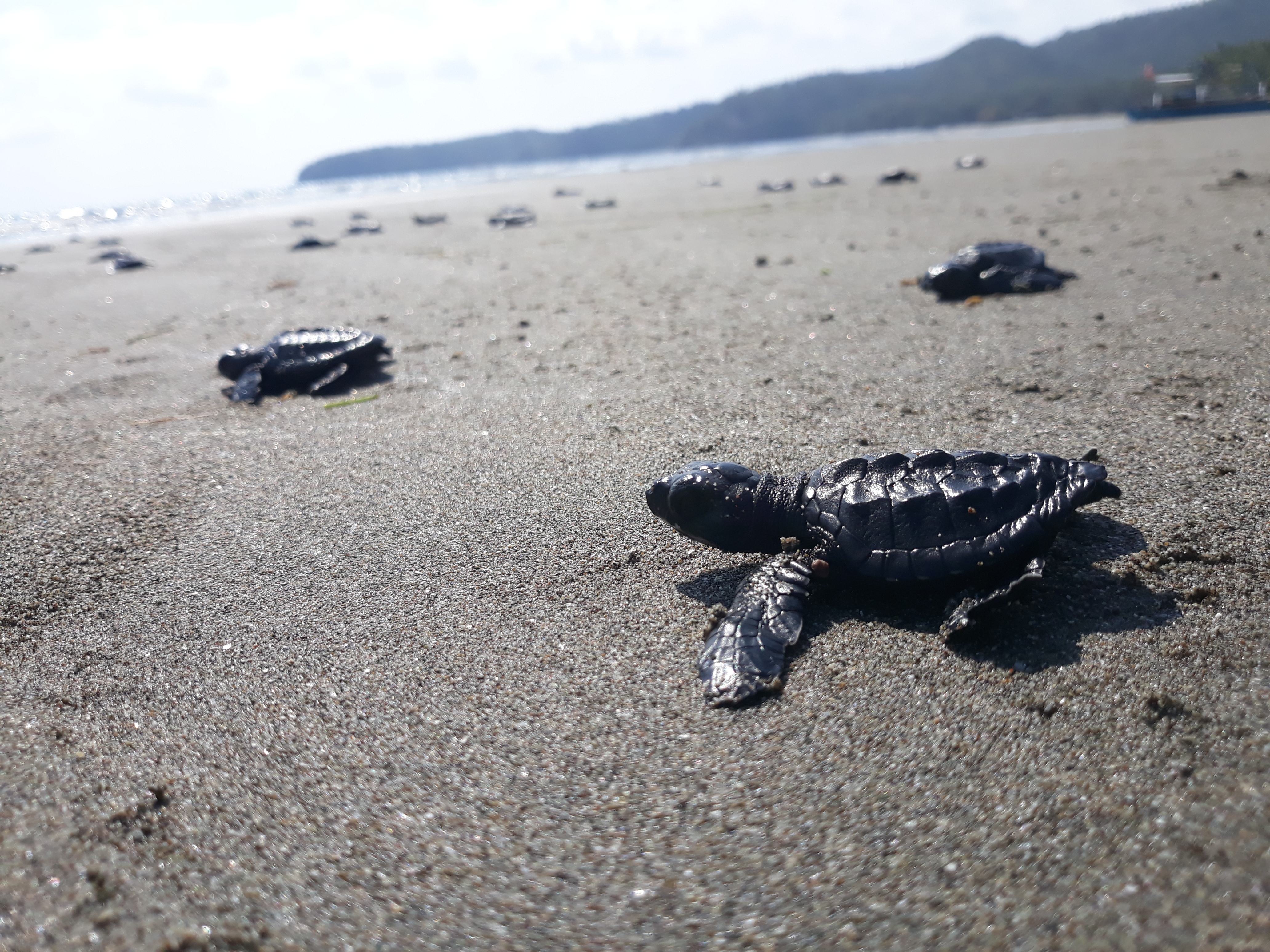‘May your tribe increase’: Send-off for 84 baby turtles

SPRINT TO SEA Some of the 84 olive ridley turtle hatchlings released in Glan, Sarangani, rush to the sea while still in their “infantile frenzy” stage. —PHOTO COURTESY OF SARANGANI ENVIRONMENT CONSERVATION AND PROTECTION CENTER
GLAN, Sarangani — “May your tribe increase,” marine conservationists in Sarangani province said on Wednesday as they bade goodbye to the 84 olive ridley turtle hatchlings they released at Barangay Cablalan here to their natural habitat.
James Gravidez, an officer of the Glan municipal environment office, Dr. Roy Mejorada of the Sarangani Environmental Conservation and Protection Center (ECPC) and Pinky Placer of the local environment group Sarangani Climate Change helped the hyperactive little turtles find their way home.
Freddie Mongkalong, a Bantay Dagat volunteer of Glan town, found the hatchlings’ mother sea turtle, or “pawikan,” on Jan. 28 as it looked for a site where it could lay its eggs.
After laying 85 eggs in her sandy nest at Purok Islam, Barangay Cablalan, the marine turtle returned to the sea.
Trained to protect marine life, Mongkalong secured the nest with makeshift barriers to protect the eggs from predators like dogs and monitor lizards that frequented the sandy beach.
With the help of neighbors and other Bantay Dagat volunteers, Mongkalong checked on the nest in regular intervals, making sure the eggs were safe in the nest.
On Wednesday, he happily informed the Glan environment office and the Sarangani ECPC that the eggs had hatched and that the baby turtles were already eager to head for the water.
Natal homing
Mejorada’s team assisted in the release of the turtles and then conducted a briefing to educate people in the area about the importance of helping the government preserve marine life.
“The turtles’ release shows Sarangani’s continuing conservation programs and the support it gets from the communities,” Mejorada said. “We help in educating the community about the importance of marine turtles in the ecosystem, the importance of keeping their natural habitat healthy.”
During the release, environmentalists performed “natal homing,” a natural process in which the hatchlings are allowed to crawl from their nest and into the sea.
“It will … [make] the hatchlings [remember] where they come from, so they [need to] get familiar [with] the grains of sand, the smell of the area and its orientation with reference to the magnetic north,” Mejorada explained.
“These smells and the environment will be remembered by the turtles [when] they return to the area in the future to lay eggs,” he added.
Mejorada couldn’t contain his happiness and the feeling of fulfillment in realizing that somehow he contributed to environmental conservation in his own little way.
“Accompanying that excitement, though, is worry—what will happen to the hatchlings in the wild, because there they face a lot of threats,” Mejorada said. “What I’m really worried about are the man-made threats such as pollution and resource degradation.”
Artificial environment
The shores of Barangay Cablalan and the nearby communities are nesting sites for sea turtles, he said, “thus the need to educate the people.”
“We are happy they are supportive and cooperative,” he added.
Turtle hatchlings, he explained, should be released immediately to the wild because keeping them in artificial environments like tubs, plastic pails and other containers would have a negative impact on them.
He quoted an advisory from Dr. Arnel Yaptinchay, founder of Marine Wildlife Watch of the Philippines, who said that “hatchlings should enter the marine environment 30 minutes after their emergence from the nest.”
Quick release
“They must be released immediately because after 30 minutes, their vigor starts to wane,” Mejorada said.
Environmentalists say hatchlings are in an “infantile frenzy,” wherein they try to move out of their nest quickly to escape predators, using just enough strength to reach the water and swim in the wild.
A day before the hatchlings’ release in Glan, Gravidez, engineer Arvel Lara, Glan Menro and some residents rescued an adult female olive ridley turtle that got stranded on the coast of Purok Panaghiusa, Barangay Burias, in Glan.
Ecologists believed the turtle may have laid eggs the night before, but they could not find the nest.














